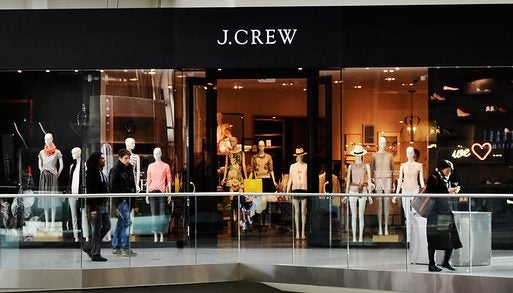
American clothing retailer J. Crew, known for its preppy-style range of women’s, men’s and children’s apparel, has filed for bankruptcy.
J. Crew Group said that in a statement released today that it had agreed to deleverage its balance sheet with financial sponsors to secure “long-term success” for J. Crew and its subsidiary, Madewell. Under the terms of the agreement, J. Crew’s lenders, including hedge fund Anchorage Capital, will convert around $1.65bn of debt into equity.
The retailer’s parent company Chinos Holdings has filed petitions for relief under Chapter 11 of the US Bankruptcy Code, which permits reorganisation under bankruptcy.
Why did J. Crew fall into bankruptcy?
The Covid-19 coronavirus has delivered a major blow to the retail industry. In the UK, Oasis and Warehouse permanently closed stores last week and Debenhams and Cath Kidston entered into administration last month. However, high-street stores including J.Crew had been struggling with sales even before Covid-19 as a result of changing consumer habits and a shift in the retail landscape.
According to the most recent US Department of Commerce report, J.Crew clothing and accessory sales dropped by 50.5% in March, with a downward trajectory.
The store was also carrying a debt of $1.7bn due to a leveraged buyout in 2011 by private equity firms TPG Capital and Leonard Green & Partners.
Response from J. Crew and its lenders
J. Crew Group CEO Jan Singer said: “This agreement with our lenders represents a critical milestone in the ongoing process to transform our business with the goal of driving long-term, sustainable growth for J.Crew and further enhancing Madewell’s growth momentum.
“Throughout this process, we will continue to provide our customers with the exceptional merchandise and service they expect from us, and we will continue all day-to-day operations, albeit under these extraordinary COVID-19-related circumstances.
“As we look to reopen our stores as quickly and safely as possible, this comprehensive financial restructuring should enable our business and brands to thrive for years to come.”
Anchorage Capital CEO Kevin Ulrich said: “J.Crew and Madewell are two classic American brands with deeply loyal customers. We look forward to supporting Jan, Libby and the management team to recognize their full potential.
“The significant deleveraging contemplated by this agreement, coupled with J.Crew Group’s strategy to strengthen its robust e-commerce platform to drive continued growth in its direct-to-consumer segment, will position the company for future success.”
The future of J. Crew
Weil, Gotshal & Manges will be serving as J. Crew’s legal counsel, Lazard as investment banker, and AlixPartners as restructuring advisor.
The retailer is still continuing with its e-commerce business, which represents more than 50% of the retailer’s total revenue, and fully expects to re-open after Covid-19 restrictions are lifted.



